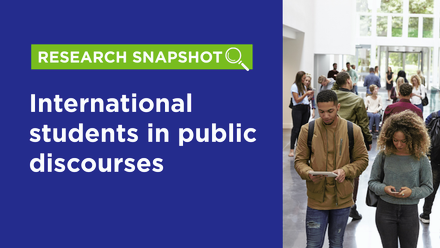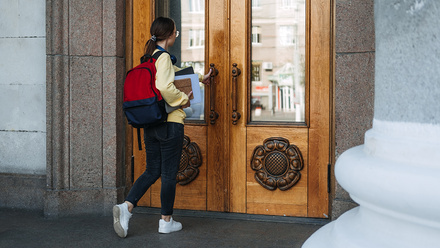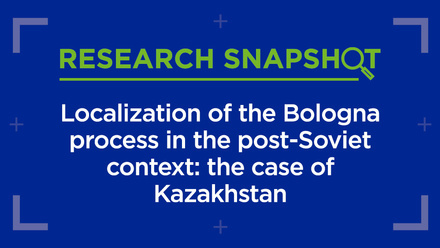The challenges and opportunities of academic migration

While mobility has always been part of academic culture, forced migration is an altogether different phenomenon. This is true for the individual teachers, professors and researchers who seek refuge abroad in times of crisis, as well as for the societies which choose to – or choose not to – take them in.
In recent times, Ukraine has of course been the greatest sender of such academic refugees to higher education institutions (HEIs) in Europe, while Russia has also seen an unprecedented exodus of the highly-educated. These have added to existing streams from Belarus, Turkey and the Middle East. As in the past, academic exiles face barriers in the form of legal status, language and culture, un- and underemployment, housing issues, tensions with colleagues, and threats from the regimes they left behind. The HEIs to which they flee in turn face bureaucratic obstacles, tightened budgets, and internal and external political pressures – but also reap the benefits of an influx of talent.
The instability of the current situation in Ukraine and elsewhere has convinced many professors that in six months they’ll find themselves "driving taxis or frothing lattes". It is up to stakeholders at all levels of higher education to prove them wrong.
Soaking up talent
Meeting these challenges – and seizing the opportunities that come alongside them – requires expanding on existing structures of recruitment and assistance, as well as more radical efforts.
Some good examples of the former are already in place. The DAAD, under funding from the German Federal Foreign Office, launched Future Ukraine, which awards grants to German universities for 2023/2024, followed by competitions for individual scholarships. Scholars at Risk (SAR) provides fellowship support for its member institutions in North America and advertises open positions and scholarship schemes at universities in a variety of countries including Germany, Czech Republic, Poland, Israel and South Africa. The Cologne/Bonn Academy in Exile joins the efforts of the eponymous universities to help Ukrainian refugee scholars, mostly in the humanities, as well as researchers from Russia and Belarus who face persecution due to their anti-war stance.
The current situation in Ukraine and elsewhere has convinced many professors that in six months they’ll find themselves ‘driving taxis or frothing lattes’
Broader action of this kind is needed. Firstly, higher education stakeholders, just like their business colleagues, need to actively advocate for more transparent and liberal visa regimes, as well as re-examining the policies for both recognising degrees and awarding degree-granting status. In addition, many academic immigrants are in need of training in internationalising their profile, including picking up languages and sharpening their academic and grant writing skills. Last but not least, like students from conflict zones, faculty may require counselling and practical everyday assistance. This is especially the case with housing, which, in inflated university markets, is often the greatest challenge for academic immigrants.
Radical solutions
International programmes, private-public partnerships and new research groups are all able to absorb some of the influx of academic migrants – but none are likely to be able to cope with present volumes, much less future ones. There are more radical solutions.
In some cases, academic migrants have been filling the gaps by building their own institutions. Some are virtual, private, tuition-funded enterprises. Based in Berlin, Off-University was founded by Turkish dissidents and allows faculty and students to teach and study anonymously. Brīvā Universitāte (Free University) in Riga was established by faculty from Moscow’s Higher School of Economics. Neither are able, as yet, to grant degrees.
Unsanctioned relocation of institutions is another option. The European Humanities University was originally established in Minsk, Belarus in 1992, but forced to relocate to Vilnius after a crackdown by the Lukashenko regime in 2005. The American University of Afghanistan was founded in 2006 as a coeducational, liberal arts institution; while it awaits a new campus in Doha, students currently live and study in Iraqi Kurdistan, Kyrgyzstan and Bard College in the US. Faculty from the progressive Moscow School of Social and Economic Sciences are attempting to draw the Russian exile community together to form a university in Montenegro.
Each of these institutions intends to have a positive influence on the homeland, serve the émigré population, train foreign specialists and foster international collaboration. Noble as they are, these efforts have been hampered by lack of organisational and fundraising experience, in addition to the (extra)ordinary challenges of exile itself.
Transnational paths forward
The most promising solution might already be in the HEI toolbox: transnational education. The idea is not new: UC Berkeley Shanghai, AFG College with the University of Aberdeen, and NYU in Doha come to mind. Yet one of the many challenges has always been to convince local faculty to uproot and move halfway around the world.
What is most needed is a change in mentality – to see those huddled masses crossing the borders not as a liability but as an opportunity
Imagine that a European university opens up a branch in collaboration with, for example, a sister institution in Central Asia. Rather than shipping their own faculty out with a pay bonus, they could support the hire of locally-based academic émigrés. Opening up a branch university gives the HEIs some scale to arrange for housing, study and research space. Potential conflicts with local staff are minimised because the partner institutions maintain their separate structures. The European university gets the benefit of highly-qualified staff at half the cost, increased contacts with the Central Asian HEI, and kudos from their national and local governments for improved relations. The Central Asian university gets top-notch expertise without the extra cost, relations with a high status institution, improved scientometrics, and more financial and administrative independence from local bureaucrats.
Best of all, this option offers flexibility. The numbers of students and faculty can shift with local needs and potential. If the conflict continues, collaboration can increase; if scholars move on or go back to a peaceful home, partners can recalibrate their relations without much overhead cost.
In the end, HEIs and academic refugees need to have the options to experiment with a combination of these and existing structures. More than any other innovation, what is most needed is a change in mentality – to see those huddled masses crossing the borders not as a liability, but as an opportunity.
The authors would like to express their gratitude to Philip Fedchin and Alexander Abashkin for their valuable assistance in the research of this article.






